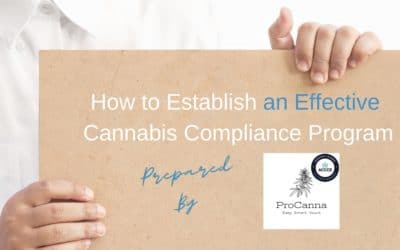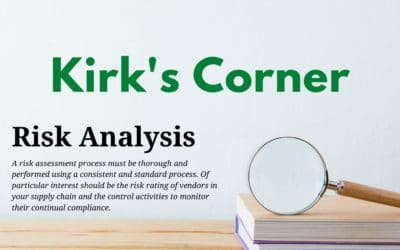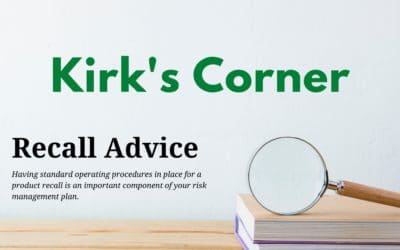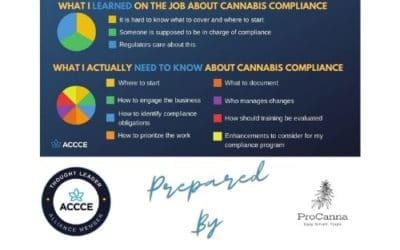When an inspector finds a deficiency or violation, how do they decide the appropriate level of punishment? While there is no standard across all states, many agencies take intent into account. Regulators evaluate the company’s compliance program—if there is one—and determine if it’s an active program or merely a paper program designed to assuage external stakeholders.
Risk Areas
Kirk’s Corner: Self-Reporting Saves $17,500
A retail dispensary self-reported non-compliant activity and the original fine of $62,500 was reduced to $45,000. Self-reporting is a positive step in addressing non-compliance and sends a positive tone from the top message to all stakeholders. Let’s examine the event and learn from it.
Single-Use Glove Recall of Cannabis Flower
Supply chain management risk comes to the forefront in a recent cannabis flower recall. It is reported that contaminated single-use gloves were responsible for a recall of cannabis flower products from a pesticide-free cannabis producer and processor in South Lake Tahoe, California. The antimicrobial chemical o-Phenylphenol was identified as the contaminant found in the FDA-compliant food-grade gloves that the grower used. Kirk Berry breaks down how a risk-based approach can be used to analyze the issue.
Kirk’s Corner – Canopy Advice
After measuring the size of the grows, the LCB determined they were out of compliance by 50%. Based on their determination, the LCB destroyed thirteen thousand pounds of harvested flower that the three growers had produced. Thirteen thousand pounds is a lot to lose so let us dive into this event, discuss risk management and compliance, and how you might approach these issues to avoid being out of compliance.
Kirk’s Corner – Recall Advice
On November 5, 2021, the cannabis compliance board from the state of Nevada issued a public health and safety bulletin for product recalls. The recall included 14 different edible products from one supplier that were distributed to 10 different dispensaries. Kirk provides a succinct analysis and 6 things to consider to make sure you are ready for a recall.
EVALI Analysis: Kirk’s Corner
The EVALI cases in 2019 were certainly a common topic of discussion. After reading this report I would like to highlight a few of the reports interesting conclusions: 1) in states where marijuana policies were in effect, a statistically lower number of EVALI cases were seen, 2) EVALI incidents were about 40% lower in states that allow recreational marijuana use, 3) contaminants found in marijuana vaping products were problematic.
Checks and Balances: Reducing Operational Risk in Commercial Cannabis
Operators must not only manage the day-to-day challenges unique to the industry, but they must also find ways to improve performance while reducing costs if they wish to remain competitive. While profitability and market share are the ultimate goal, maintaining compliance in an ever-changing regulatory environment puts additional pressure on companies looking to carve out their piece of the pie. Unfortunately, the pursuit of profits and the desire for a competitive advantage can sometimes lead to hasty decisions that result in unnecessary operational risk. The good news is that with the proper planning, processes, and systems in place, managers and executives can significantly reduce the operational risk associated with their business.
10 Steps for an Effective Cannabis Compliance Program
Like most things in life, you can think of risk management and compliance on a spectrum. We have three basic areas of the spectrum. In the middle, we find most operators who want to avoid deficiency notices, fines, and enforcement. They’re interested in managing risk and compliance, but may not have spent the time or resources to master the process. For all of you who are looking to develop and implement a compliance program or seek to improve the program you already have, this article is for you.
How to Prevent Distribution of Cannabis to Minors – Key Similarities Between Canada and the U.S.
The Cannabis Act has explicit rules for the packaging and labeling of cannabis products to ensure that they do not take on an appearance of something that might be enticing or appealing to young persons. The rules are comparable in the U.S., even if they vary slightly by state law.
One situation where both jurisdictions can learn from each other’s mistakes occurred in 2020. A raffle held at a Canadian youth hockey tournament contained a prize consisting of several cannabis products. The winner was an eight-year-old boy who was participating in the tournament.
Comply or Go Awry: Highlights From a Commercial Cannabis Enforcement Action and How to Protect Your Business
Commercial cannabis businesses tend to focus on preserving compliance with regulations in order to satisfy licensing requirements; however, managing risk holistically involves more than looking at the regulations.
Read this real-world case study of a commercial cannabis enforcement action and learn how to protect your business from potential penalties.










